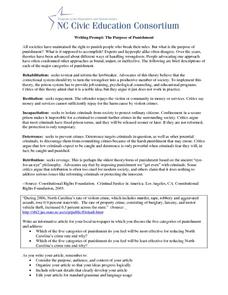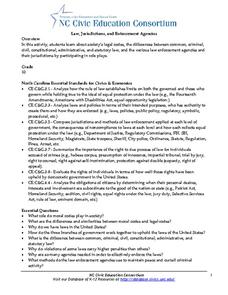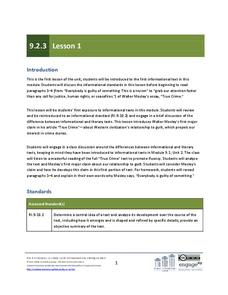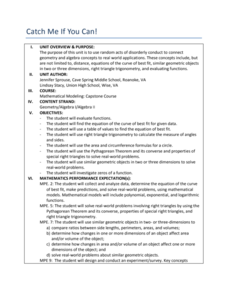Carolina K-12
Writing Prompt: The Purpose of Punishment
When punishment is given in a society when a member breaks its rules, what is it meant to accomplish? After summarizing the significant categories of punishment (rehabilitation, restitution, incapacitation, deterrence, and retribution),...
Carolina K-12
Law, Jurisdictions, and Enforcement Agencies
How do you determine what law enforcement agency has jurisdiction when a crime has been committed? That's the challenge facing class members in this role-play activity.
College Board
2000 AP® Psychology Free-Response Questions
The New York City police chief wants to know if teens commit more crimes after watching violent television shows. What kind of study helps answer the question? Learners must describe a successful study. They also examine the...
Echoes & Reflections
Perpetrators, Collaborators, and Bystanders
After the Holocaust, the world grappled with how to bring justice to the Nazis. But what to do with the thousands—if not millions—who allowed it to happen? Young historians consider the issues of guilt, collaboration, and responsibility...
DocsTeach
Prohibition and Its Consequences
Organized crime and speakeasies ... just another day during Prohibition. An intriguing activity explores the world of Prohibition and its consequences on life in the United States. Scholars analyze primary sources and place them on a...
National Endowment for the Humanities
Societal Schisms and Divisions
The final lesson plan in the Crime and Punishment unit looks at the societal injustices depicted in Dostoyevsky's novel. Scholars examine the schisms between men and women, between wealth and poverty, between religion and skepticism, and...
Curated OER
Crime in Europe
Learners investigate the relationship between theft and drug offenses in a European context. They establish whether there is a relationship between crime and drugs on a national basis within the EU. Each student produces and interprets...
Curated OER
Math Maven's Mysteries: Time for a Crime
In these math word problem worksheets, students help solve the mystery 'Time for a Crime.' Students read the story and use the ferry schedule to help track down the thief. Students circle the name of the guilty suspect.
Curated OER
Race and Crime in the United States: Are We Victims of Discrimination or Antiheroes?
Using methods adopted by Public Policy Analysts (PPA) class groups define a social problem, gather evidence to document the existence of the problem, identify causes, evaluate existing policies designed to deal with the problem, develop...
Curated OER
Lessons in Legal Ethics: Crime and the Media
High schoolers examine a variety of ethical issues that arise in criminal cases. They get into groups, and perform a case study of a real situation in which many of these ethical issues came up. All of the worksheets needed to...
University of Southern California
Deconstructing Genocide: The Ultimate Crime Against Humanity
There are eight stages of an atrocity known as genocide, and it's important to understand how they are represented so we can fight against it in the future. As young historians watch video clips of ten Jewish Holocaust survivors'...
EngageNY
Grade 9 ELA Module 2, Unit 3, Lesson 1
"True-crime stories, murder mysteries, up-to-the-minute online news reports, and (as always) rumor and innuendo grab our attention faster than any call for justice, human rights, or ceasefires." Or so says Walter Mosley in his Newsweek...
Teaching Civics
Legal Ways: Extended Jurisdiction Juvenile
An amazing set of resources! Found here are several lessons that work in conjunction to help learners better understand the juvenile court system. Learners review the judicial process, discuss how juveniles are tried, and hold a class...
Radford University
Catch Me If You Can!
Crime doesn't pay, but everyone can learn from it. Learners consider different situations involving mischief at a school, such as stink bombs and rockets, and analyze them using mathematics. They must apply trigonometry, quadratic...
K20 LEARN
Government and Your Right To Vote: Voting Rights In America
Gaining voting rights was difficult over the course of decades, but the debate over who should actually be allowed to cast a ballot remains. Scholars explore the history of the struggle, including the fifteenth and nineteenth amendments,...
Curated OER
Should Hate Be Outlawed?
Students investigate hate crime legislation. In this hate crime lesson, students examine the St. Paul city ordinance that outlawed hate crimes. Students explore the fine between hate crime legislation and First Amendment rights.
Curated OER
Problem Based Learning
Students increase problem solving skills. They research computer-related crimes, classifying them into the types of crimes. Students create a crime report. They present a presentation to the class.
Curated OER
The Sentencing Activity
Learners simulate a trial where a crime has been committed and a judge decides on the sentencing. In this trial lesson plan, students discuss why boys and girls may view crimes differently.
Curated OER
Life Science: DNA Whodunit?
Learners role play an honorary detective to assist in solving a crime committed. They investigate by a bank robbery and interview eyewitnesses using their Crime Investigation Notebook and clues from an eyewitness account from the...
Curated OER
Society Dominoes
Students are introduced to six victims of a crime. They role play characters in the scenario and discuss feelings as the scene unfolds. Through brainstorming and role playing strategies, they increase their understanding of the rights of...
Curated OER
The Youth Criminal Justice Act
Students review the Youth Criminal Justice Act and examine the consequences for young people who commit crimes. They investigate the rehabilitation and reintegration processes associated with the act.
Curated OER
Zen and the Art of Murder
Students describe the importance of citizen involvement in the judicial system. They play the role of a witness to a crime scene by watching the video clip. Students discuss how differing eyewitness accounts can affect a police...
Curated OER
ADULT ESOL LESSON PLAN--Safety and Security
Students, after reviewing and drilling on a unique vocabulary list of terms, analyze the proper procedures for fire, crime or medical emergencies. They examine how to stay calm and collected during such emergencies and why its important...
Curated OER
High School Sikh Lesson Plan
Students examine post 9/11 backlash. In this hate crimes instructional activity, students watch "Dastaar," a documentary featuring Sikh discrimination. Students discuss their impressions of the documentary.
Other popular searches
- Crime Prevention
- Crime Scenarios
- Crime Scene
- Crime Fiction Genre
- Motivation Crime
- Crime Scene Investigation
- Crime Drama
- Crime Stories
- Hate Crimes
- Crimea Conference
- Crime Scene Investigator
- Crime and Punishment

























